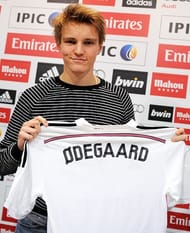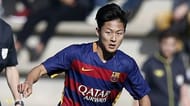On 19 August 2014, Norwegian teenager Martin Odegaard became the nation’s youngest international after playing 90 minutes in a 0-0 draw against the United Arab Emirates. He had already become a YouTube sensation, had been interviewed by the international press and according to his father, more than 30 European clubs were interested in him.
A few months later, Odegaard and his father embarked on a trip across Europe, visiting the training facilities at Liverpool, Arsenal and Ajax among other clubs. Eventually, the battle for his signature was won by Real Madrid, reportedly with an offer up to £80,000 a week in salary and bonuses.
A few years before the Odegaard furore, a 12-year-old South Korean footballer caught the attention of FC Barcelona when he finished as the top scorer in the 2010 Danone Nations Cup (an equivalent of World Cup for U12s). In 2011, Lee Seung Woo joined FC Barcelona and went on to establish his status as one of La Masia’s top talents. Before long, “Lee Seung Woo – The Next Messi?” videos were readily available on YouTube.
Both the wonder kids had conquered the Internet – now the relatively simple matter of making it in the real world was left to do.
Long story short, the two prodigies are yet to live up to their YouTube billing. Both these players will enter their twenties in a couple of years but have not achieved anything yet to suggest they are ready to feature week in week out in a top European league. Of course, that’s not the benchmark to rate a normal 18-year-old; but then, hardly anything about the hype that surrounded their formative years suggested normalcy.
Let’s examine the story of two wonder kids who are yet to grow up into wonder men. Presenting (hopefully) the future (albeit a distant one) of Real Madrid and Barcelona:
Martin Odegaard

Easily the more familiar story among the two, Odegaard’s predicament at Real Madrid has been held up as a model story to illustrate the pitfalls that await a gifted youngster in modern football. When Real Madrid signed him in 2015, the deal was not straight forward by any means: it allegedly contained clauses including the assurance that he would be housed in the same hotel as the first team, a €50,000 bonus for every game with the first team and other clauses to enforce rather than nurture a route to the first team. As part of the arrangement, Martin Odegaard’s father Hans Erik Odegaard took up a position as a youth coach with Real Madrid, too.
Two years on, Odegaard is yet to translate his hype to performances on the pitch. It had been announced that he would train with both the club’s first team and the reserves, Real Madrid Castilla; and that he would play for the latter team. Eventually, this arrangement hampered his development – the Castilla staff had problems with him training away from the rest of the team. Throw in the language barrier as well, and a young Odegaard had a lot on his plate to deal with.
In January 2017, Dutch club SC Heerenveen signed Odegaard on loan for 18 months. Away from the spotlight, Odegaard started finding his feet slowly in a less physical environment, starting a handful of matches in succession. But then an away loss to Excelsior sparked a run out of the first team. Coach Jurgen Streppel clearly favoured defensive solidarity as Heerenveen embarked on a difficult run of fixtures – and as does often happen in such situations, a diminutive creative youngster was the victim of the policy.
Lee Seung Woo

Ah, so let’s pick up where we left off on this story. Having joined La Masia, a 13-year-old Lee went on to score 39 goals in 29 games for the under-13s, breaking a record set by none other than Lionel Messi himself. Going into the U-16 Asian Championships in September 2014, Lee was South Korea’s big name; and he justified the tag with performances that earned him the player of the tournament award.
However, his development took a hit when Barcelona were found by FIFA to have violated regulations that govern the transfer of minors. For two years, he was unable to play an official match for Barcelona and was reduced to appearing only in exhibitions and friendlies. His 18th birthday, in January 2016, coincided with the end of Barcelona’s ban on registering new players.
However, with Lionel Messi, Luis Suarez and Neymar backed up by other talented youngsters like Munir El Haddadi and Gerard Deulofeu, a path to the first team has been difficult to come by. It is difficult to overcome the lingering feeling that Barcelona’s ban may have adversely affected Lee’s career – Messi had the opportunity to make his debut for Barcelona when he was just 16.
According to latest reports, Italian team Hellas Verona have signed Lee, with Barcelona retaining a buy-back option for 2 years. Having missed the chance to play competitive football for two straight years, Lee might already be playing catch up – he needs to get this move right. Hopefully, he does.
What next?
At 18 and 19 years of age, it would be absolutely preposterous to suggest that these youngsters have no future. When he was 19 years of age, Gareth Bale was understudy to Benoit Assou Ekotto as Spurs’ second choice left back. Jamie Vardy at 20 was earning £30 a week at Stocksbridge Park Steels, and Rickie Lambert was working in a beetroot bottling plant to make ends meet.
However, these stories serve to show how difficult it is to make it as a professional player in contemporary football. In earlier times, the reputation of a precocious talent remained confined within the boundaries of the neighbouring club at most; now Barcelona might turn up at your doorstep if you impress for your local club. As tempting as that might sound, it could prove detrimental to the natural development of a player in homely surroundings.
Let's give our wonder kids a breather. We should try our best to keep the media away from these players, causing unrealistic expectations and setting off social media tirades. Signing players early to ensure they get adequate training and development from a young age is fine, but parading them as the latest show piece jewel in your crown collection is not.
Best wishes, Lee and Martin. On behalf of all football lovers, we hope you grow up and prove your detractors wrong.
